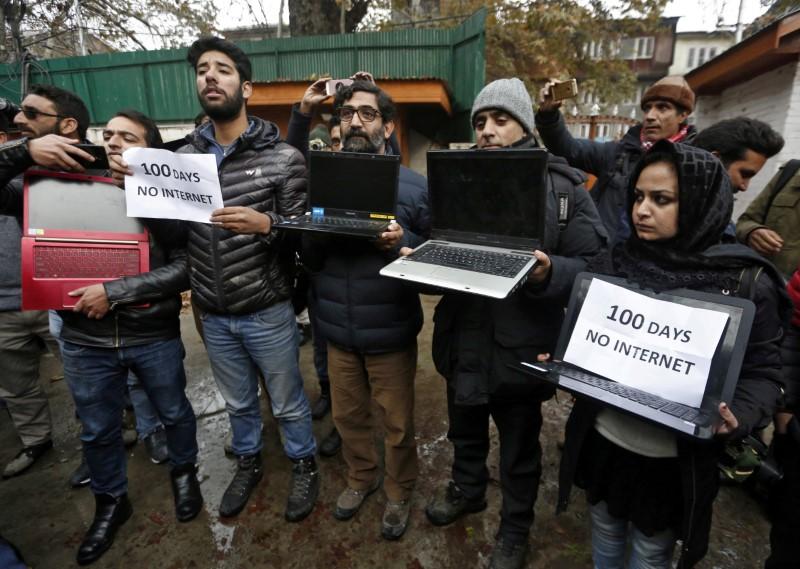Free And Fearless Journalism In The Midst Of A Fight For Survival
May 4, 2024 | Pratirodh Bureau
FILE PHOTO: Kashmiri journalists display laptops and placards during a protest demanding restoration of internet services in Srinagar
Freedom of the press, a cornerstone of democracy, is under attack around the world, just when we need it more than ever.
A free press is a cornerstone of democracy, crucial for holding elected politicians accountable and fostering informed public discourse.
As the world marked World Press Freedom Day on May 3, this freedom and the independent media crucial to safeguarding democracy was seen as increasingly coming under threat.
Journalists across the world are being intimidated, harassed and attacked. They are being put under surveillance, subjected to physical violence and online abuse and increasingly put behind bars by misusing the law and the judicial process.
This is apart from information being controlled by the state through regulatory laws.
Journalists’ attempts to foster public accountability from elected representatives is increasingly pitting them against the power of the state which is threatened by such truth telling.
A prison census conducted by the Committee for the Protection of Journalists (CPJ) estimated that as of December 1, 2023, there were 320 journalists behind bars for their reporting. This was the second highest recorded since the CPJ census began in 1992.
The top ten countries to jail journalists were China, Myanmar, Belarus, Russia, Vietnam, Iran and Israel (tied for the sixth position), Eritrea, Egypt and Turkey.
According to the CPJ, “At least 94 of the 320 journalists in the 2023 census – almost 30 percent – are known to have health problems. Many cannot get medications or access to doctors but their families are often reluctant to speak out for fear of reprisal against their relatives.”
While authoritarian states routinely repress journalists, one would expect democratic societies to create and nurture a safe environment for the media. However, a media environment free from violence and obstruction seems to be shrinking even in some democratic societies.
Two critical arenas where threat to journalism and journalists are playing out dramatically are Israel and India, both self-proclaimed democracies which profess a commitment to uphold freedom of the press. Seventeen of the 320 journalists in jail are in Israel and seven in India.
But prison is not the only threat that journalists face in these two countries.
The Israel-Gaza war is proving the most deadly for the practice of journalism. It is estimated that since October 7, 2023, at least 97 journalists and media workers were among the more than 34,000 killed in Gaza and the West Bank and 1200 dead in Israel.
Journalists in Gaza are particularly vulnerable as they have to report in the midst of Israeli ground assaults and airstrikes with disrupted communication, power outages and supply shortages.
In India, grave threats have emerged to the media with journalists being silenced and imprisoned for critical reporting. The Indian state has been using strong-arm tactics to subdue critical reportage as the regime in power tries to reverse India’s constitutional commitment to secularism as well as cultural and religious diversity.
Such is the power of the state to control the media space by denying access and government advertisements that many news organisations in India have succumbed – and offer uncritical support to the government.
The legal process is used wantonly to file police charges against journalists to criminalise their work and stigmatise them as “terrorists” or “anti-national” elements using a whole host of laws, ranging from counter-terrorism laws to preventive detention provisions without any charges being filed while journalists suffer in jail with routine denial of bail.
The state’s desire to control the media has become even more intense as India enters into a prolonged period of voting in a general election.
Foreign news entities like the BBC have been forced to virtually shut shop and restructure some operations in India, while foreign correspondents are being constrained in their reporting using a variety of strategies. These range from restrictions on visas, cancelling the Overseas Citizen of India card (a lifetime residency permit) given to those born of Indian-origin parents or with Indian spouse and denying them permission to report on elections to accusing them of journalistic activities “inimical to the interest of the sovereignty and integrity of India.”
At least two foreign correspondents – one from France, another from Australia – have been forced to leave the country recently. Those within, have been forced to write an open letter to the government criticising it for pushing out foreign correspondents on the eve of an election that it describes as the “largest democratic exercise in the world.”
While the spread of social media has made it a powerful alternative tool for the dissemination of news and views, states have responded by asserting their right to control these platforms.
Big Tech is willingly cooperating with authoritarian regimes or those with tendencies towards authoritarianism – from China, Saudi Arabia and Turkey to India — to control the social media platforms.
The regimes themselves are introducing new laws which allow them to shut down digital sites and force the platforms to cooperate with them in taking down critical content. In addition, big social media companies are also deprioritising content moderation, including policies to check hate speech, which is often promoted by some regimes.
The challenges and obstacles are many and the solutions, few. Yet, despite this, journalism remains indispensable, especially in confronting global crises.
(Originally published under Creative Commons by 360info™)
